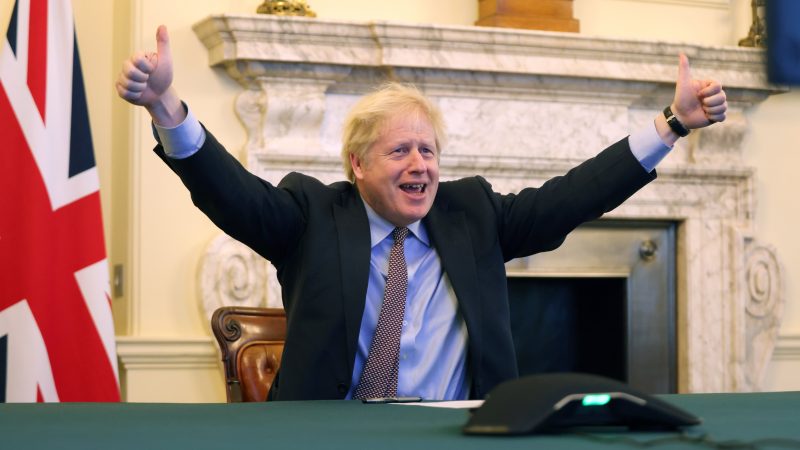
The potential no deal outcome feared by many in the Labour Party has been averted one week before the end of the transition period, as the United Kingdom and the European Union have agreed a trade deal on Christmas eve.
When the UK leaves the European single market and customs union on December 31st, new arrangements set out in the trade agreement will come into force and allow tariff-free trade in goods.
Responding to the news, a Labour spokesperson said: “Since the election, the Labour Party has urged the government and the EU to secure a trade deal because that is in the national interest. We will be setting out our formal response to the deal in due course.”
It is understood that Keir Starmer will be meeting with the shadow cabinet shortly and is planning to hold a press conference setting out his full response to the Brexit deal agreed by the UK government this afternoon.
Labour frontbenchers have repeatedly said over recent weeks that the leadership is minded to whip MPs to vote in favour of a Brexit deal because the party has consistently called on the Prime Minister to deliver a deal and avoid no deal.
“The clock is no longer ticking,” EU chief negotiator Michel Barnier declared this afternoon. He added that the UK had decided to give up the benefits of EU single market membership as the deal “does not reproduce” them.
Barnier revealed that the UK government decided not to participate in the Erasmus exchange programme. On free movement, he said: “The level of ambition in terms of the mobility of citizens is not in line with our historical ties”.
A No 10 Downing Street spokesperson said: “The deal is done. Everything that the British public was promised during the 2016 referendum and in the general election last year is delivered by this deal.
“We have taken back control of our money, borders, laws, trade and our fishing waters. The deal is fantastic news for families and businesses in every part of the UK. We have signed the first free trade agreement based on zero tariffs and zero quotas that has ever been achieved.”
Delivering a statement from Downing Street, Boris Johnson said parliament will be recalled and he expected MPs to vote on the post-Brexit deal next week on December 30th – just one day before the transition period ends.
Labour’s Mark Drakeford, First Minister of Wales, described the agreement as a “thin deal”. He added: “It will still be a difficult deal for Wales but it provides a platform to which we can return to argue for improvements in the future.”
Scottish Labour leader Richard Leonard responded to the news by criticising Boris Johnson for causing “huge economic uncertainty” with “irresponsible brinksmanship” and “leaving it to the 11th hour to secure a deal”.
But Leonard added: “We must now look at the detail of the deal, and move on with a plan to protect jobs, incomes and our public services in Scotland, as we face a pandemic-driven recession.”
Commenting on the UK-EU trade deal, TUC general secretary Frances O’Grady said: “This deal is better than nothing, but not by much. It won’t protect jobs and puts hard-won workers’ rights on the line.
“As we come out of the pandemic, we’re facing a crunch point for jobs and living standards. This deal is on the Prime Minister’s head – it’s his responsibility to make sure working families don’t end up worse off.
“Now the Prime Minister must make good on his promise to level up Britain. And he needs to act fast. There can be no more pointing the finger at the EU. Government must deliver an industrial strategy for decent work, with investment in jobs and green industries in parts of the country that need it most.
“Ministers must also urgently build on this deal to overcome the barriers to trade and higher production costs many sectors will face which puts jobs at risk. And we will not accept a race to the bottom on rights.”
Steve Turner, Unite’s assistant general secretary for manufacturing, said: “Relieved as we are and thin as the deal may be, we consider the deal to be the floor and certainly not the ceiling of our future trading relationship.”
UNISON general secretary Dave Prentis commented: “Any deal is better than the catastrophe of no deal. But the government’s mishandling of Brexit means even with this agreement, working people and public services still face huge uncertainty.”
GMB’s Warren Kenny said: “The Prime Minister has got his deal, the buck stops with Number 10 now. He needs to deliver on the promises he made. He must give workers and business leaders the clarity and support they have lacked for the past five years.”
Manuel Cortes, general secretary of transport union TSSA, said it was a “relief” that no deal had been avoided but “today is a sad day” that will leave the future “uncertain” and “we will all be poorer in years to come”.




More from LabourList
‘Tackling poverty should be the legacy of Keir Starmer’s government’
‘The High Court judgment brings more uncertainty for the trans community’
‘There are good and bad businesses. Labour needs to be able to explain the difference’